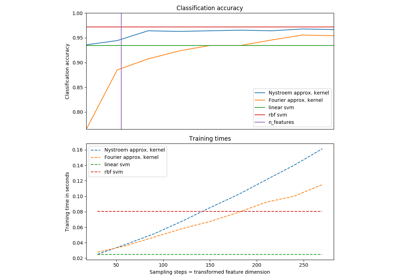sklearn.kernel_approximation.RBFSampler¶
-
class
sklearn.kernel_approximation.RBFSampler(gamma=1.0, n_components=100, random_state=None)[source]¶ Approximates feature map of an RBF kernel by Monte Carlo approximation of its Fourier transform.
It implements a variant of Random Kitchen Sinks.[1]
Read more in the User Guide.
Parameters: - gamma : float
Parameter of RBF kernel: exp(-gamma * x^2)
- n_components : int
Number of Monte Carlo samples per original feature. Equals the dimensionality of the computed feature space.
- random_state : int, RandomState instance or None, optional (default=None)
If int, random_state is the seed used by the random number generator; If RandomState instance, random_state is the random number generator; If None, the random number generator is the RandomState instance used by np.random.
Notes
See “Random Features for Large-Scale Kernel Machines” by A. Rahimi and Benjamin Recht.
[1] “Weighted Sums of Random Kitchen Sinks: Replacing minimization with randomization in learning” by A. Rahimi and Benjamin Recht. (http://people.eecs.berkeley.edu/~brecht/papers/08.rah.rec.nips.pdf)
Examples
>>> from sklearn.kernel_approximation import RBFSampler >>> from sklearn.linear_model import SGDClassifier >>> X = [[0, 0], [1, 1], [1, 0], [0, 1]] >>> y = [0, 0, 1, 1] >>> rbf_feature = RBFSampler(gamma=1, random_state=1) >>> X_features = rbf_feature.fit_transform(X) >>> clf = SGDClassifier(max_iter=5, tol=1e-3) >>> clf.fit(X_features, y) ... # doctest: +NORMALIZE_WHITESPACE SGDClassifier(alpha=0.0001, average=False, class_weight=None, early_stopping=False, epsilon=0.1, eta0=0.0, fit_intercept=True, l1_ratio=0.15, learning_rate='optimal', loss='hinge', max_iter=5, n_iter=None, n_iter_no_change=5, n_jobs=None, penalty='l2', power_t=0.5, random_state=None, shuffle=True, tol=0.001, validation_fraction=0.1, verbose=0, warm_start=False) >>> clf.score(X_features, y) 1.0
Methods
fit(X[, y])Fit the model with X. fit_transform(X[, y])Fit to data, then transform it. get_params([deep])Get parameters for this estimator. set_params(**params)Set the parameters of this estimator. transform(X)Apply the approximate feature map to X. -
__init__(gamma=1.0, n_components=100, random_state=None)[source]¶ Initialize self. See help(type(self)) for accurate signature.
-
fit(X, y=None)[source]¶ Fit the model with X.
Samples random projection according to n_features.
Parameters: - X : {array-like, sparse matrix}, shape (n_samples, n_features)
Training data, where n_samples in the number of samples and n_features is the number of features.
Returns: - self : object
Returns the transformer.
-
fit_transform(X, y=None, **fit_params)[source]¶ Fit to data, then transform it.
Fits transformer to X and y with optional parameters fit_params and returns a transformed version of X.
Parameters: - X : numpy array of shape [n_samples, n_features]
Training set.
- y : numpy array of shape [n_samples]
Target values.
Returns: - X_new : numpy array of shape [n_samples, n_features_new]
Transformed array.
-
get_params(deep=True)[source]¶ Get parameters for this estimator.
Parameters: - deep : boolean, optional
If True, will return the parameters for this estimator and contained subobjects that are estimators.
Returns: - params : mapping of string to any
Parameter names mapped to their values.
-
set_params(**params)[source]¶ Set the parameters of this estimator.
The method works on simple estimators as well as on nested objects (such as pipelines). The latter have parameters of the form
<component>__<parameter>so that it’s possible to update each component of a nested object.Returns: - self


